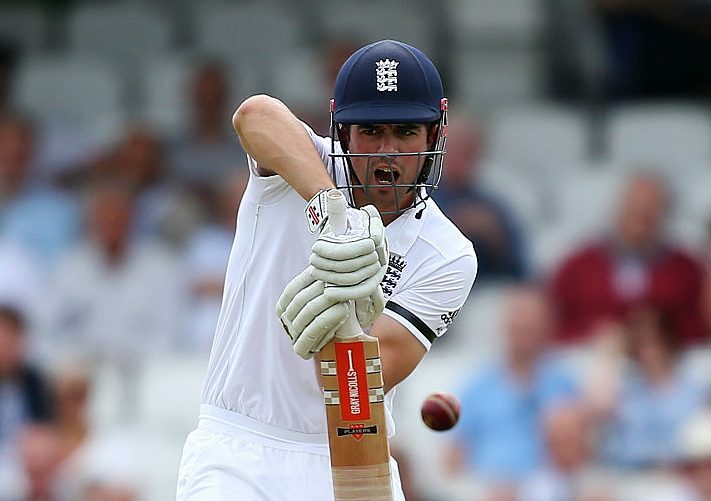By Peter Hayter
While Joe Root and his every move would have been subjected to the minutest scrutiny from the moment England’s new Test captain stepped out at Lord’s for the start of his first match in charge, the attention of possibly just as many would have been focused on the man he replaced.
The gap in England’s Test programme created by the first half of the home summer being filled by the ICC Champions Trophy means that, even before the series against South Africa began yesterday, before a coin had been tossed, a T-sign made, a ball faced or a bowler advised to take a blow, Root had already held the captaincy for several months longer than the entire reign of some of his predecessors.
And since Alastair Cook bowed to the inevitability of time, tide and his team’s “stagnation” by resigning as its leader back in February, and once Root was appointed in his stead shortly afterwards, the question going hand in hand with how the Yorkshire batsman will cope with the demands of the job is how England’s longest-serving skipper might cope without them.
Those who have seen England captains come and go recall that, for different reasons, neither of Cook’s two previous full-time predecessors had the chance to find out if they could successfully return to the ranks. After having given it a go, a third quickly decided enough was enough.
Nasser Hussain did continue as a player for 12 further Tests after stepping down as captain during the 2003 summer series against the Proteas. But a year later, sensing nothing further could be gained by the team or him from his continued presence, the fiery battler decided that a cover-drive for four to win the Lord’s Test against New Zealand was a decent way to bring his playing career to an end.
Michael Vaughan answered a nation’s prayer for somebody (anybody) to wrest back the Urn from Australia in the 2005 Ashes but, when he left the field at Trent Bridge after South Africa’s victory had ensured England could not win the 2008 series, he resigned the captaincy the very next day.
Sadly for him, his efforts to fight his way through injury to enable him to resume his international career failed, and he never batted for England again.
At the end of the 2012 series against South Africa, worn down by the Kevin Pietersen saga, textgate, and the disappointment of the series defeat which cost England their number one Test ranking, Andrew Strauss left the dressing room at Lord’s knowing he was cooked and that he would never again walk back in as a player, either for England or Middlesex.
There are those who argue that an ex-captain hanging on risks trouble, that, by his very presence, he can confuse the issue and that necessary change is less likely to happen successfully unless the outgoing captain just keeps going out.
Despite all his brilliance and experience, for instance, one wonders whether Graham Gooch may regret his decision to keep going after he decided in the 1993 Ashes that the team was better off with a new man at the helm.
Others will counter that argument by highlighting the example of Alec Stewart and Michael Atherton, who both enjoyed golden summers and winters once they had departed the toughest job in British sport, both easing past the 100-cap mark.
One obvious factor in Cook’s favour is his age, 32. Of the six skippers before him, only Atherton, at 29, was younger when he stepped down as leader.
Another, and this may prove far more significant, is that captaincy was a role Cook neither sought nor coveted, nor, though he had led England at Under-19 level, when he did take over the senior side, did he see himself as anything other than a batsman first and foremost. And that is same as it ever was.
Cook understood his true value as captain was leadership by example, through runs and commitment and focus, not through tactical inspiration. And though not exactly a reluctant skipper, it always appeared his prime motivation for doing the job was a sense of duty, sorely tested at the loudest point of the furore over KP’s sacking for which he found himself carrying the can and bearing the brunt of the highly personal and unwarranted abuse that followed it.
So, while there is batting to be done, there are runs to be made and matches to be won, the thought of him brooding at first slip, or sticking pins in a Joe Root voodoo doll under the lid at short leg, or giving his successor anything but his 100 per cent backing and advice when asked for, is quite simply laughable.
That is not to say he found giving up what he called “the incredible honour”
of being England captain anything but painful nor that he will not miss it, for it was a role he had grown into and he took it as personal failure that the team was unable to fulfil the promise suggested by their brilliant win in South Africa last year, slipping back to fourth in the ICC rankings after a desperately disappointing defeat in India.
While, with the players at his disposal, it is hard to think what Cook could have done differently, the contrast with his feeling after leading England to a rare win on the sub-continent at the first time of asking could not have been more stark.
“The hard bit was giving it away,” said Cook in the days after making his announcement. “Being honest with myself and saying: yeah, it’s time to go. I felt, unfortunately, that I was done.
“But it is also exciting in one sense because it’s another phase of my career.”
Indeed it could be, because, at 32, with 11,057 runs from 140 Tests, should he stay fit and maintain form, he could open the batting for England for another five years at least, the target of overhauling Sachin Tendulkar as the leading Test run-scorer of all time well within his grasp.
Like all real winners, England’s leading Test run-scorer, century-maker and most capped cricketer has always been suitably impressed and motivated by personal milestones. There is nothing wrong with that and his form in county cricket this season – including six hundreds in all cricket – indicates there is plenty more to come, yesterday’s first innings brainstorm notwithstanding.
Which is why, while we will be keeping an eye on Root in the days, weeks and Ashes ahead to see how he settles into his new life, it will be well worth keeping half of the other eye on Cook to see how he settles into his.












